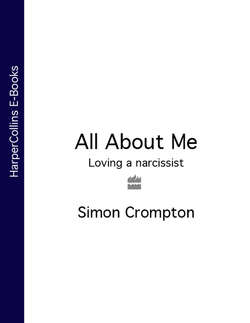Читать книгу All About Me: Loving a narcissist - Simon Crompton - Страница 10
THE TRUTH ABOUT NARCISSISM
ОглавлениеWhat it all comes down to is this: Narcissism is about everything you thought it was, but more. It’s about a natural and in-born self-centredness – the same conviction of one’s own centrality to the universe that we see in a thread running from the myth of Narcissus through to the celebrities posing in their beautiful homes in Hello! magazine. In infancy, it is a natural means of self-protection.
This should wane as we become adults, in all but extremely stressful situations. But in some people whose sense of self is not well-developed, this doesn’t happen. To hide their lack of confidence at dealing with things, they cover up their inner vulnerability by projecting a kind of artificial self. It’s a peculiar and malformed type of egotism, which has much in common with the egotism of a child. And it can range from a tendency to self-obsession to highly problematic behaviour patterns that can constitute a personality disorder.
Narcissism is a spectrum of selfishness. It describes something eternal about human beings, because it’s about our relationships, both with people and the world around us. It’s so fundamental that you can put it into virtually any context. In the ethical context, it’s about the contrast between selfishness and altruism. In the religious context, it’s the contrast between pride and humility. In the social context, it’s about individualism and society. In the context of personal relationships, it’s about being insensitive or sensitive to another person’s needs.
Was Sherlock Holmes a narcissist?
Sherlock Holmes has been accused of many things since the death of his creator Sir Arthur Conan Doyle. One recent play revealed that he and his nemesis Moriarty were actually the same person.11 A novel has fingered him as Jack the Ripper.12 And many tourists to Baker Street in London have even insisted he’s factual.
But now we can reveal that, like many other isolated and cold heroes of detective fiction, he was also a narcissist.
Let’s look at the facts. Holmes has few real friends and leads a solitary, inward-looking life – with the distinctly unsociable habits of pipe-smoking and cocaine. His one constant companion, Dr Watson, suits him because he slavishly caters to his whims. Perhaps more significantly, Watson provides him with the means to perpetuate the majesty of his myth – by writing up his exploits for consumption by the wider world.
According to the American commentator on narcissism, SamVaknin, the Watsons of this world ‘provide the narcissist with an obsequious, unthreatening audience and with the kind of unconditional and unthinking obedience that confirms to him his omnipotence … They are the perfect backdrop, never likely to attain centre stage and overshadow their master.’13
Moreover, Holmes often publicly humiliates Watson, chastising him for being dimwitted. Love and empathy are rarely on display in Holmes – apart from in one particular case, the famous A Scandal in Bohemia, where Watson gives an account of the only glimmering of romantic admiration Holmes ever displayed. In fact, it merely serves to illustrate his emotional iciness.
To Sherlock Holmes she is always THE woman. I have seldom heard him mention her under any other name. In his eyes she eclipses and predominates the whole of her sex. It was not that he felt any emotion akin to love for Irene Adler. All emotions, and that one particularly, were abhorrent to his cold, precise but admirably balanced mind. He was, I take it, the most perfect reasoning and observing machine that the world has seen, but as a lover he would have placed himself in a false position. He never spoke of the softer passions, save with a gibe and a sneer. They were admirable things for the observer – excellent for drawing the veil from men’s motives and actions.
Holmes is not interested in having relationships with people – he’d rather use them as a source of stimulation for his constantly restless brain. To the narcissistic personality, others can be merely a means to distract, entertain or glorify. And Watson is the main instrument of his manipulation. In The Adventure of the Copper Beeches, Holmes coolly criticises Watson for the way he is writing up his accounts of the sleuth’s deductive brilliance, putting too much emotion into his records rather than the bare facts.
‘It seems to me that I have done you full justice in the matter,’ I remarked with some coldness, for I was repelled by the egotism which I had more than once observed to be a strong factor in my friend’s singular character.
‘No, it is not selfishness or conceit,’ said he, answering, as was his wont, my thoughts rather than my words. ‘If I claim full justice for my art, it is because it is an impersonal thing – a thing beyond myself …’
Sherlock Holmes had been silent all the morning, dipping continuously into the advertisement columns of a succession of papers until at last, having apparently given up his search, he had emerged in no very sweet temper to lecture me upon my literary shortcomings.
In Sam Vaknin’s terms, a classic cerebral narcissist. If he had been around today, Watson would be declaring to the world that he was a victim of narcissistic emotional abuse.
It’s on this last, perhaps most practical, aspect that this book focuses, but it will touch on all the other areas in the process. Narcissism is anathema to relationships, which by their very nature cannot revolve around one ‘self’. Even in its milder everyday forms, narcissism can cause annoyance that may escalate into larger problems with relationships at home and work. At the more extreme end, it may be ruining your life.
So what effect is narcissism having on you? Read on, and the next chapter will try and help you find out.
